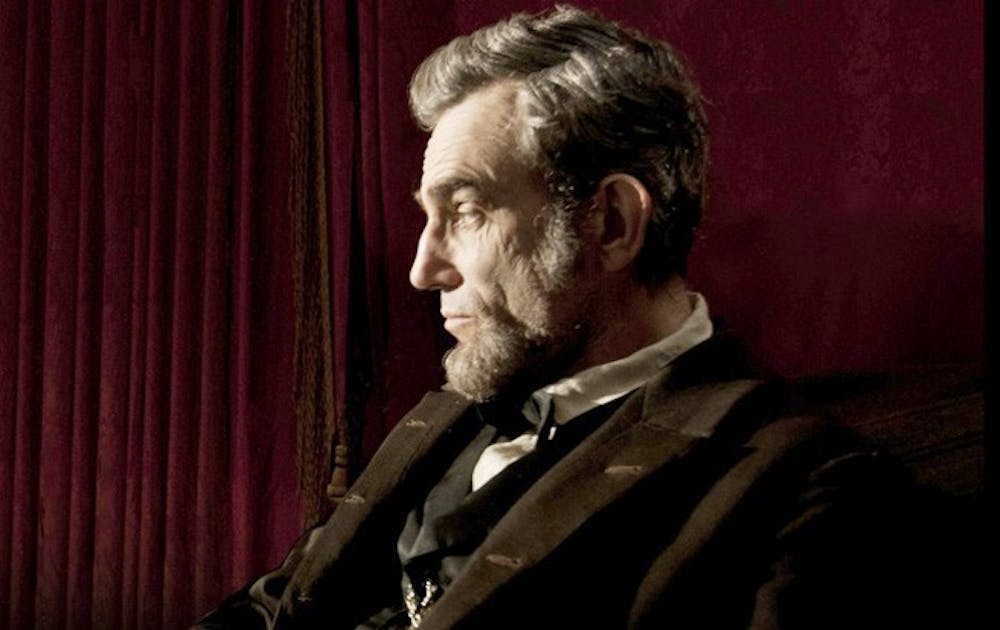The people who inhabit the Washington D.C. of Steven Spielberg’s latest historical drama, Lincoln, could be well-described by Snoop Dogg’s—forgive me, Snoop Lion’s—song “G’s and Hustlas.” These eponymous characters, Snoop reflects, “want some, get some, bad enough, take some.” They are wheeler-dealers, unscrupulous figures trying their hardest to advance in politics—and presumably, in the process, make their “sh*t dope.” In particular, proceedings of the House of Representatives are about as loud and raucous as your average frat party. Votes for bills or amendments transcend meek “yes”’s or “no”’s into ear-splitting shrieks of “YAYYY” or “NAYYY.” Outspoken abolitionist Rep. Thaddeus Stevens (Tommy Lee Jones) can’t help but call a whole lot of people “nincompoops.” Throughout the film, representatives, true legislative frat-stars, deliver rousing speeches at the House podium. In this Congress, resulting celebratory Busch-Light-shot-gunning sessions would not feel out of place.
This is the flawed system Abraham Lincoln (Daniel Day-Lewis) must contend with in order to pass the Thirteenth Amendment of the Constitution abolishing slavery. More significantly, the Civil War is in full force, and hundreds are dying. On one occasion, Lincoln’s oldest son Robert (Joseph Gordon-Levitt) spies a wheelbarrow full of limbs and proceeds to puke (otherwise he is entirely forgettable, albeit cute). Lincoln has some family troubles—an unhappy marriage, grief over his dead son—but he must choose politics over home life. In order to implement law and influence legacy, Lincoln must play the game intelligently and realistically. When you play the game of politics, you win or your legislation dies.
So Abe makes do. This is not the honest Abe we think we know; Lincoln reminds us that he is “the President of the United States, clothed in immense power.” To obtain votes for the Amendment, he deals in patronage and bribery, offering jobs and titles in exchange for votes. He employs shady negotiators who occasionally resort to outright bullying to influence dissenting Democrats.
Day-Lewis’s Lincoln is tall, a little stooped. He is calm, patient and shrewd, with subtle warmth and wit. He speaks in tales and metaphors; my favorite concerns George Washington and the act of sh*tting. Day-Lewis wisely chooses to characterize the sixteenth president with subtlety and nuance, letting the monumental nature of the man speak for itself. Day-Lewis spent a year preparing for this role, studying speeches and even texting Sally Field (who plays Mary Todd) in character. This is a mesmerizing performance; it’s hard to believe Day-Lewis is not Abe in the flesh.
Because this is a period drama, Lincoln’s producers had some fun with setting. There is an astonishing variety of facial hair, from toothbrush mustaches to curly sideburns extending the entire length of a face. Secretary of State William Seward (David Strathairn) remains unfortunately clean-shaven, but during one scene, he wears a fantastic yellow spangled kimono-jacket. Thaddeus Stevens is similarly [and tragically] hairless, but, for his part, wears the worst wig ever (there can be no other way to describe this brown, fluffy concoction). This, along with Jones’ passionate—and ultimately adorable—performance, makes for great entertainment.
The result of all this is as good a movie as has been in theaters this year. For a film about the last few months of Lincoln’s life—I mean, you already know how it’s going to end—Lincoln remains relevant, despite a dearth of battles with Confederate vampires. Like our friend Snoop, Spielberg’s Lincoln is a lion of a film rather than a dog.
Get The Chronicle straight to your inbox
Sign up for our weekly newsletter. Cancel at any time.

